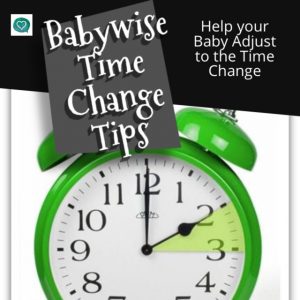Just when we think we’ve got a good routine going with our little ones, the calendar shows the end of Daylight Saving Time is quickly approaching. This year we’ll “fall back” an hour on Sunday, November 5th. You may be concerned that when the time changes, your child’s bedtime at 7 p.m. will become 6 p.m. and consequently he will wake up at 6 a.m. instead of 7 a.m. Or even worse, if he normally has an early wake up time, what if he wakes up at 5 a.m. because his body says it 6 a.m.!?!
Here are a few factors to consider when thinking through the impact the time change will have on your family:
- Temperament: both yours as a parent and your baby/child’s.
- Parent: are you easy-going or a bit more concerned about “doing it all right”, especially in the area of sleep?
- Baby: has he been a great sleeper from the get-go or more of a challenge in the area of sleep patterns and length of sleep?
- Knowing yourself and your baby/child helps you prepare for the change, especially if this is your first time dealing with the time change issue.
- Since this happens twice a year, spring (when we move the clocks ahead an hour) and fall (when we move the clocks back an hour), keep expectations realistic in approaching the change.
With the fall equinox already passed, you are probably noticing dwindling daylight hours and your little one may already appear to be ready for bed earlier than he did during the brighter summer evenings. You can take advantage of that! The following suggestions will depend on your existing routine and his nap/sleep schedule.
- If your little one is 3 months old or younger and still has either a dream feed or one feeding during the night, you likely won’t need to do anything about the time change. Just let the natural rhythm run its course.
- If your little one has achieved the skill of sleeping through the night, you might want to adjust his naps by 15-30 minutes during the day (being mindful of cues of fatigue and sleepiness) so that you end up with his regularly scheduled bedtime.
- A week prior to the time change, you can gradually move his bedtime later by 10-15 minute increments every couple of days so that when the time change does occur, there is only a 30-minute difference between his current bedtime and the new adjusted bedtime after the change.
- If you decide to make no prior modifications, a little one who has been on a good routine, as a general rule, will usually only take a day or two to adjust and will then go right back to his regular sleeping pattern.
Probably the bigger concern for ‘falling back’ is that the mornings become lighter earlier. Depending on which direction your child’s room faces in the morning, you may want to make sure the room remains darker, so his body doesn’t kick into gear at 5:30 a.m. thinking it’s 6:30 a.m. And even if he does wake then, there is no need to rush in and pick him up. Try giving him 15-30 minutes to see if he’ll fall back to sleep or at least play quietly in his crib.
The bottom line is, if your little one has been on a good routine, the change in time, whether you are “falling back” or “springing ahead”, should not cause a major disruption in sleep patterns. You’ve already learned to recognize your baby’s sleep cues and know his or her sleep disposition, so use that to your advantage. Make the necessary adjustments at nap time and be confident that a 30-, or even a 45-minute difference with bedtime is not going to throw off the whole routine indefinitely. The biggest, dare I call it a mistake parents make, especially with the fall change, is thinking; “oh we can stay up an hour longer because we get an extra hour in the morning!” A better thought is; “oh, we get an extra hour of sleep”.
Anne Marie Ezzo serves with her husband in ministering to families around the world through Growing Families International. For the past 30+ years her passion has been, and continues to be, to encourage wives and moms to practically understand what it means to “love your husband and children”.





Leave a Reply